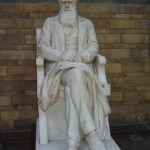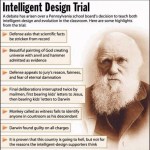darwin
Mathematicians and physicists speak of a result 'falling out of the equations', implying that if you set things up properly, the rest takes care of itself. Chapter 4 of the Origin, 'Natural Selection', is where evolution falls out of the machinery that Darwin has spent the three previous chapters assembling.
And I hate to say it, but it's a bit of an anticlimax.
In retrospect, it's difficult to see how it could be otherwise. Darwin has manoeuvred us into position so carefully, showing the power of artificial selection, the mutability of species and nature's cutthroat struggle, that we're…
If, so far, you've been finding Mr Darwin's book tough going (it's OK, there's no shame in admitting it), here's what you should do: skip all that flannel about variation, and start here. This is where it gets serious.
Chapter 3 of the Origin, as its opening pages explain, faces in two directions. In chapters one and two, we've established the fact of variation, and the fluidity of living forms -- both in space, as shown by the blurry boundaries between species, and in time, as shown by the effect of artificial selection on domestic species. In the chapter to come, says Darwin, we'll be…
I get e-mails about such events, so I thought I'd share, so you can attend some of these talks if you want:
NCSE's executive director Eugenie C. Scott will be speaking twice in North Carolina shortly.
First, at 7:00 p.m. on January 27, she will be speaking on "Darwin's Legacy in Science and Society" in the Wright Auditorium on the East Carolina University campus in Greenville. "Charles Darwin's publication of On the Origin of Species in 1859 was an extraordinary milestone for science, but it also had profound effects on theology, philosophy, literature, and society in general. Nowhere is…
Homeschool Showcase (Formerly The Carnival of Cool Homeschoolers) #15 is up at Weird, Unsocialized Homeschoolers. I've got an item listed in the carnival, which is typical (I often send potentially useful science content material to the homeschooling carnivals.)
While you're studying Earth science, you may want to check out Nature's Evolutionary Gems posted by Greg Laden at Greg Laden's Blog. It's up to you whether you use it to teach evolution as fact or as a teachable moment as you discuss God's creation. I know how we'll be using it. ;-)
Wink wink indeed!
Man, this guy didn't know anything.
I don't mean that as an insult. Darwin, as he admits, knew almost nothing about inheritance, about how variation is produced, or about the origins and history of domesticated plants and animals. You'd think that would be a handicap in using domestication as an analogy for evolution.
And yet, in chapter 1 of the Origin, 'Variation Under Domestication', Darwin uses what little knowledge he has so deftly that nowhere do you feel his conclusions are outstripping his data. This, believe me, is quite a skill, both in a scientist and a writer. What, he asks, is…
Among the small thrills of encountering canonical works for the first time - Homer, say, or the King James Bible, or Star Wars - are the moments when you come across some turn of phrase so well-used it has been worn flat into the surface of everyday speech and think: so that's where that comes from. I'm thinking that the same might be true of the Origin, but in a different way.
For example, what's the first living thing that Darwin names? Turns out it's "the woodpecker, with its feet, tail, beak and tongue so admirably adapted to catch insects under the bark of trees".
This got me thinking…
Hi! My name is John. I've got a PhD in evolutionary biology, and I've spent much of the past decade writing about evolutionary ideas, as applied to everything from literary criticism, to language, to anti-terror policy, and even on occasion to biology. And I've got a confession - I've never read the Origin of Species.
Do I shock you? Good.
I am not proud of this (really, I'm not), but if my professional life has been less stellar than it might have been, it's not for want of reading Darwin. Here's why. Darwin was working at the dawn of biology. He had none of the specialist knowledge and…
One hundred and seventy-four years ago, Charles Darwin first set foot on the Galapagos Islands aboard the Beagle. Since then, the islands and the unique species they house have been a source of inspiration for many an evolutionary biologist. Even so, it is gratifying to see that even now, on the bicentennial of Darwin's birth, the Galapagos have not yet finished yielding their secrets.
During Darwin's five-week stint on the Galapagos, he observed two types of iguana. One was a marine version that, uniquely for lizards, swam and fed in the ocean, and the other was a cactus-eating landlubber…
tags: Sandwalk, Down House, Darwin, nature, photography, London, England, Bromley, England
Part of The Sandwalk, which is located on the periphery of a large parcel of land that is occupied by Darwin's Down House and associated grounds comprised of flower gardens, food plant gardens, and a greenhouse. I liked the mysterious look of this portion of the Sandwalk, so I photographed it to share with you.
Image: GrrlScientist 31 August 2008 [larger view].
Sunday, the day after the Nature Network Science Blog conference was over, Mike, Mo and I caught a train to Bromley, England, where we…
tags: Sandwalk, Down House, Darwin, nature, photography, London, England, Bromley, England, sciblog
A gate in a brick wall next to the greenhouse behind Darwin's Down House, where Darwin conducted a lot of his botany experiments.
Image: GrrlScientist 31 August 2008 [larger view].
Sunday, the day after the Nature Network Science Blog conference was over, Mike, Mo and I caught a train to Bromley, England, where we toured Darwin's Down House and Gardens and walked along the famous Sandwalk that Darwin once walked. This is part three of my photoessay series about Down House, where I focus on…
tags: Sandwalk, Down House, Darwin, nature, photography, London, England, Bromley, England
Darwin's Down House near Bromley, England, a short train ride away from London. This view of the house was snapped from the gardens in back of the house. If you look closely, you can see part of the cafe (under the blue umbrellas) to the right of the crooked tree in this picture.
I am really proud of this photograph, by the way.
Image: GrrlScientist 31 August 2008 [larger view].
Sunday, the day after the Nature Network Science Blog conference had concluded, Mike, Mo and I caught a train to Bromley,…
Check out this podcast from the Institute for Humanist Studies.
In this month's audio podcast we are dedicating the entire program to one story. During the 1970s, P. Thomas Carroll read and transcribed hundreds of Charles Darwin's personal correspondences for research purposes. Carroll shares his story of becoming intimately familiar with the great 19th century evolutionary biologist over the course of several years and 14,000 letters.
Darwin and Wallace, chillin' Let's talk about Darwin and Wallace's joint presentation on Natural Selection in 1858.
It is not usually the case that I write a blog post for a carnival. I usually just write for the blog, then now and then sit down and figure out which posts should go to with carnivals. That is not the case with this post.
Some time ago I thought, while writing a Peer Reviewed Research post, that it would be interesting to write up older papers, classics, or more recent papers that were of great interest for one reason or another but maybe a few years old. Just around…
Natural Selection was proposed jointly by Alfred Russel Wallace and Charles Darwin on this day 150 years ago.
Darwin discovered the principle of Natural Selection, and worked it out, over several decades prior. Meanwhile A.R. Wallace also came up with Natural Selection as the mechanism for what he was seeing in the wild. Some time in June it became known to Darwin that this guy Wallace as about to roll into town and present his theory. By July 1st, a deal was worked out.
They famously decided to present Wallace's essay (without first asking his permission!), along with two unpublished…
30 years ago, biologists thought they'd solved one of Darwin's thorniest problems, the evolution of sterile social insects:
No doubt many instincts of very difficult explanation could be opposed to the theory of natural selection,âcases, in which we cannot see how an instinct could possibly have originated...I will not here enter on these several cases, but will confine myself to one special difficulty, which at first appeared to me insuperable, and actually fatal to my whole theory. I allude to the neuters or sterile females in insect-communities: for these neuters often differ widely in…
With all this talk about Expelled!, the creationist movie, I thought it was about time to resurrect the review I wrote many moons ago of Flock of Dodos by Randy Olson, along with some updated information.
Flock of Dodos is a much better film than Expelled!, and explores the same issue, with somewhat different conclusions. So, for instance, if you are going to use one of them in a school or church to explain the ID/Evolution controversy, I recommend Flock.
(That's a picture of Randy with some big birds at the Tribeca Film Festival.) Plus, since its been out a bit longer, Flock of Dodos is…
Steve Mirsky does a little Darwin Quote Mining reversal exercise in a recent post called "Never You Mine: Ben Stein's Selective Quoting of Darwin:"
One of the many egregious moments in the new Ben Stein anti-evolution film "Expelled" is the truncation of a quote from Charles Darwin so that it makes him appear to give philosophical ammunition to the Nazis. Steve Mirsky reports.
Steve rightly corrects stein, but does not put the quote mining in sufficiently broad context. So I do:
The original text from Darwin that Stein refers to in Expelled! expresses Darwin's ambivalence about the social…
Good question ... what IS in the air?
The simple answer is that the air ... the Earth's atmosphere ... is about 78% nitrogen, 21% oxygen, with a tiny amount of some other gases including water vapor. Then, there's dirt. I want to talk a little about the oxygen, one of the other gases (carbon dioxide to be exact), the water vapor, and the dirt.
Oxygen
The oxygen is one of the most important parts to us because we (and all the other animals) need it to breath. To me, what is most interesting about the oxygen is that in the old days ... before any animals or plants evolved but life…
There's a movie coming out on Creationism, Intelligent Design, and Evolution, called Expelled, and it's narrated/hosted by Ben Stein (right), a TV/film personality who is an overall intelligent guy (and used to have the TV show Win Ben Stein's Money), and used to be a Nixon speechwriter. Politically, he's quite conservative (for example, immediately following 9/11 he gave a speech where he called abortion "the worst form of terrorism"), but this movie is apparently one of the worst abuses of science since What the Bleep do We Know?! came out.
The movie has an innocuous enough premise: is…

